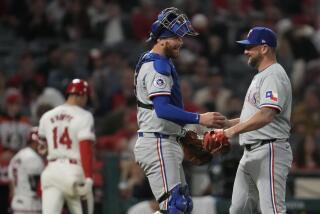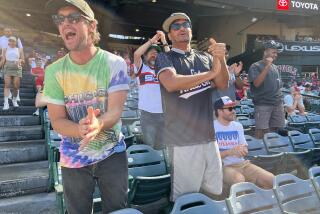Angels Are Left Thinking What If
- Share via
BOSTON — Mike Scioscia has preached all season that any loss, no matter how frustrating, how excruciating, how devastating, is simply one game in the loss column.
The Angel manager leaned heavily on those words again Monday night after the Boston Red Sox erased a two-run lead in the ninth inning and a one-run lead in the 11th for a heart-stopping 7-6 victory over the Angels before 32,795 in Fenway Park.
But try telling Orlando Palmeiro, who came within inches of a diving catch of Brian Daubach’s two-out, two-run bloop single that scored the tying and winning runs in the 11th, that this was just another loss.
Or closer Shigetoshi Hasegawa, who came within one unlucky decision by first baseman Mo Vaughn of a game-ending triple play in the 11th, nearly escaping a bases-loaded, no-out jam before Daubach’s game-winner.
Or second baseman Adam Kennedy, who smashed a three-run homer in the seventh to give the Angels a 5-2 lead, executed a perfect suicide squeeze in the 11th to give the Angels a 6-5 lead and turned three huge double plays, one in the 11th.
Or right fielder Tim Salmon, who watched helplessly as Daubach’s game-tying two-run homer in the ninth sailed over his head, and who was punched out on controversial calls at third base in the fourth inning and home in the eighth, the first of which led to Scioscia filing an official protest.
“Definitely, some losses are tougher than others,” Salmon said. “Some days, you just get beat, and then there are days you feel like one got away. That’s how I feel about this game.”
The Angels recovered from Daubach’s ninth-inning homer off starter Scott Schoeneweis to score in the 11th when Troy Glaus doubled, took third on Bengie Molina’s sacrifice and scored on Kennedy’s squeeze.
But Nomar Garciaparra drew a walk off reliever Mark Petkovsek in the 11th, and Troy O’Leary, after missing one bunt attempt, laced a single to right off reliever Mike Holtz, moving Garciaparra to third.
Hasegawa replaced Holtz and walked pinch-hitter Scott Hatteberg to load the bases, and the Angels brought their infield in. Jason Varitek hit a firm one- hopper Kennedy, who started a home-to-first double play, but with the runners freezing momentarily on the apparent line drive, Manny Alexander and O’Leary got terrible jumps off first and second.
After fielding Molina’s throw from home, Vaughn’s instinct was to go to third to get the lead runner, but O’Leary barely beat the throw. Vaughn didn’t realize he had plenty of time to get Alexander at second.
“When I looked to first, Alexander hadn’t even passed me,” Kennedy said. “I was just trying to spit it out to Mo when he threw to third. I couldn’t get it out in time. I think we would have had him easily.”
Instead, the Red Sox had runners on second third, leaving Scioscia with a tough decision: Walk Daubach and pitch to Trot Nixon with the bases loaded or go after Daubach? Scioscia chose the latter, and Daubach responded with his seventh game-winning hit in Boston’s last at-bat in the last two seasons.
“You’ve got to pick your poison,” Scioscia said. “Shige threw a terrific pitch, and Daubach served it to left field, and that was the ballgame. I was more comfortable pitching to Daubach with an open base than to Nixon with the bases loaded.”
The Angels had a chance to blow the game open when they loaded the bases with no outs in the eighth, but Red Sox center fielder Carl Everett threw out Salmon at the plate on Molina’s fly ball, even though replays appeared to show Salmon was safe.
But the call that really fried Scioscia was in the fourth, when Salmon was ruled out at third despite there being no umpire within 80 feet of the play. With the bases loaded and one out, Molina flied to shallow center, where Everett couldn’t make a sliding catch. Vaughn scored from third, but Salmon held near second until the ball dropped.
Second baseman Jose Offerman fired to third baseman Lou Merloni, and it was unclear whether Merloni’s foot was on the bag when Salmon slid in. Third-base umpire Jerry Meals had sprinted toward the outfield to rule on the popup, and second-base ump Derryl Cousins remained about 10 feet in front of second. It was Cousins who raised his arm, calling Salmon out.
“Cousins was grossly out of position,” Scioscia said. “He didn’t even see the play, and he refused to ask for help, even though he has a responsibility to do so. I think that was a gross injustice to our team, and it’s grounds for a protest.”
The protest was filed with the commissioner’s office. Chances are remote it will be upheld, but if it is, the teams would have to replay the game from the point of the disputed call.
More to Read
Go beyond the scoreboard
Get the latest on L.A.'s teams in the daily Sports Report newsletter.
You may occasionally receive promotional content from the Los Angeles Times.







